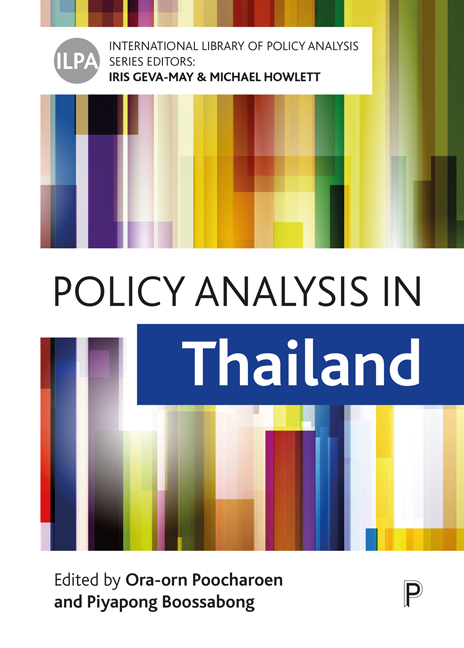Book contents
- Frontmatter
- Contents
- List of figures and tables
- List of abbreviations
- Notes on contributors
- Editors’ introduction to the series
- Introduction
- Part One History, styles and methods of policy analysis in Thailand
- Part Two Policy analysis within executive government
- Part Three Policy analysis beyond executive government
- Part Four Political parties and interest groups in policy analysis
- Part Five Policy analysis education and research
- Index
two - Methods of policy analysis in Thailand: bureaucratic, managerial, academic and participatory orientations
Published online by Cambridge University Press: 20 January 2024
- Frontmatter
- Contents
- List of figures and tables
- List of abbreviations
- Notes on contributors
- Editors’ introduction to the series
- Introduction
- Part One History, styles and methods of policy analysis in Thailand
- Part Two Policy analysis within executive government
- Part Three Policy analysis beyond executive government
- Part Four Political parties and interest groups in policy analysis
- Part Five Policy analysis education and research
- Index
Summary
Introduction
To understand how governments perform public policy, recent studies on public policy analysis highlight the roles of institutions, practices, instruments and the interplay of policy actors. For instance, Lascoumes and Le Gales (2007) and Peters (2016) point out the importance of the institutional rule and how de jure and de facto standards affect actors’ policies and their interactions with different values and preferences. Howlett (2018) emphasises character and context in policy choices. Knoepfel et al (2007) state that policy design could be shaped by the culture, structure and procedure of highly fragmented state entities. Margetts and Hood (2016) focus on various instruments and how policy choices are made.
These factors explain different ‘methods’ of policy analysis. This chapter explains how the methods are utilised in Thailand. Underlying values and policy learning continuity classify the four types of policy analysis methods in Thailand. The observed methods can be categorised into bureaucratic-oriented, managerial-oriented, academic services and participatory methods (see Table 2.1).
Each method shapes policy by its purposes, dominant values, institutional rules and key actors in a particular political context (Mayer et al, 2013; Clemons and McBeth, 2017). This chapter will demonstrate the four classifications of methods of policy analysis in Thailand. Its purposes, background, the context in which it is applied, institutional rule and de facto standards, and instruments or tools will be clarified. Moreover, the advantages and disadvantages of each type will be discussed. The last section provides suggestions for further studies on the methods of policy analysis.
Bureaucratic-oriented methods
The bureaucracy is rather stable while the political apparatuses are short-lived in Thailand. Bureaucracy has been able to provide stability even without stable governments. As Etzioni-Halevy (1983), Poocharoen (2012) and Bowornwathana (2013) have mentioned, political instability has offered great opportunities for the administrative actors to expand their authority in the political area. The underlying value of this method is continuity of development. Institutional rules and the skills of officials within public agencies are, fundamentally, the means used by governments for continuing policies, defining policy problems, designing policies and learning policy outcomes.
- Type
- Chapter
- Information
- Policy Analysis in Thailand , pp. 28 - 46Publisher: Bristol University PressPrint publication year: 2023



